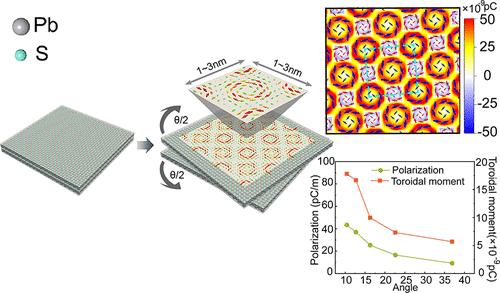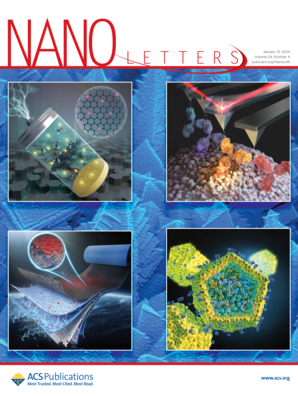Ultrahigh-Density Polar Vortex Lattice in Square-Shaped Moiré Bilayers of Lead Chalcogenides
IF 9.6
1区 材料科学
Q1 CHEMISTRY, MULTIDISCIPLINARY
引用次数: 0
Abstract
Nanoscale exotic polar topological structures, such as vortices and skyrmions, hold promise for next-generation electronic devices, yet their spontaneous formation in 2D van der Waals (vdW) materials remains quite challenging. Herein, we demonstrate from first-principles that ultrahigh-density polar vortices emerge in the square moiré bilayer formed by twisting two layers of centrosymmetric PbS with the D4h point group. The emerged ferroelectricity arises from the inherent complex strain associated with the twisted structures, and the resulting electron polarization is much greater than that obtained in sliding ferroelectricity. Notably, the engineered strain patterns are characterized by peculiar inhomogeneous in-plane fields with a checkerboard distribution of uniaxial tension. This nanoscale nonuniform strain produces an ultrahigh-density vortex polarization lattice. The results from our study not only reveals a new mechanism for electric polarization and polar topologies in moiré bilayers but also provides opportunities for designing 2D ultrahigh-density electric devices.

方形莫伊里双层铅钙钛矿中的超高密度极涡晶格
纳米级奇异极性拓扑结构(如漩涡和天幕)为下一代电子器件带来了希望,然而它们在二维范德华(vdW)材料中的自发形成仍具有相当大的挑战性。在此,我们从第一性原理出发,证明了在两层具有 D4h 点基团的中心对称 PbS 扭转形成的方形莫伊里双层中会出现超高密度极性涡旋。出现的铁电性源于与扭曲结构相关的固有复杂应变,由此产生的电子极化远大于滑动铁电性。值得注意的是,工程应变模式具有奇特的不均匀面内场特征,单轴拉力呈棋盘式分布。这种纳米级非均匀应变产生了超高密度的涡旋极化晶格。我们的研究结果不仅揭示了摩尔纹双层膜电极化和极性拓扑的新机制,而且为设计二维超高密度电气设备提供了机会。
本文章由计算机程序翻译,如有差异,请以英文原文为准。
求助全文
约1分钟内获得全文
求助全文
来源期刊

Nano Letters
工程技术-材料科学:综合
CiteScore
16.80
自引率
2.80%
发文量
1182
审稿时长
1.4 months
期刊介绍:
Nano Letters serves as a dynamic platform for promptly disseminating original results in fundamental, applied, and emerging research across all facets of nanoscience and nanotechnology. A pivotal criterion for inclusion within Nano Letters is the convergence of at least two different areas or disciplines, ensuring a rich interdisciplinary scope. The journal is dedicated to fostering exploration in diverse areas, including:
- Experimental and theoretical findings on physical, chemical, and biological phenomena at the nanoscale
- Synthesis, characterization, and processing of organic, inorganic, polymer, and hybrid nanomaterials through physical, chemical, and biological methodologies
- Modeling and simulation of synthetic, assembly, and interaction processes
- Realization of integrated nanostructures and nano-engineered devices exhibiting advanced performance
- Applications of nanoscale materials in living and environmental systems
Nano Letters is committed to advancing and showcasing groundbreaking research that intersects various domains, fostering innovation and collaboration in the ever-evolving field of nanoscience and nanotechnology.
 求助内容:
求助内容: 应助结果提醒方式:
应助结果提醒方式:


